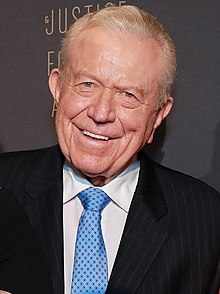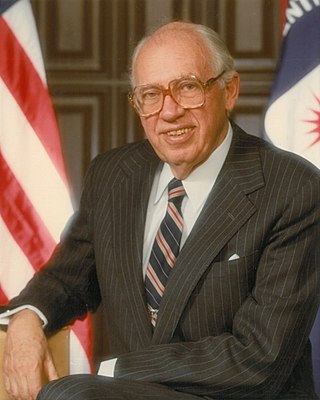
William Joseph Casey was the Director of Central Intelligence from 1981 to 1987. In this capacity he oversaw the entire United States Intelligence Community and personally directed the Central Intelligence Agency (CIA).

John Bowden Connally Jr. was an American politician who served as the 39th governor of Texas (1963–1969) and as the 61st United States Secretary of the Treasury (1971–1972). He began his career as a Democrat and later became a Republican in 1973.

The Texas Senate is the upper house of the Texas Legislature, with the Texas House of Representatives being the lower house. Together, they compose the state legislature of the state of Texas.
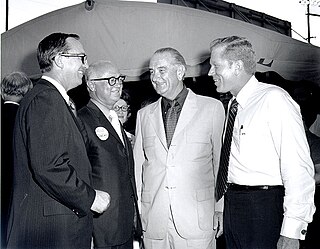
The Sharpstown scandal was a stock fraud scandal in the state of Texas in 1971 and 1972 involving the highest levels of the state government. The name came from the involvement of the Sharpstown area of Houston.
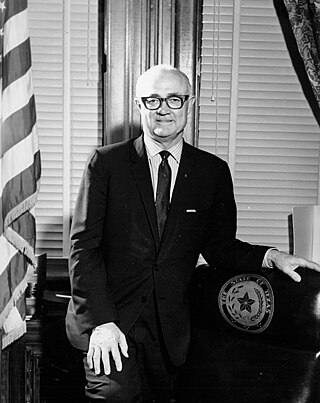
Preston Earnest Smith was an American entrepreneur and politician who served as the 40th governor of Texas from 1969 to 1973. A member of the Democratic Party, he previously served as the lieutenant governor from 1963 to 1969.

Robert Schwarz Strauss was an influential figure in American politics, diplomacy, and law whose service dated back to future President Lyndon Johnson's first congressional campaign in 1937. By the 1950s, he was associated in Texas politics with the faction of the Democratic Party that was led by Johnson and John Connally. He served as the Chairman of the Democratic National Committee between 1972 and 1977 and served under President Jimmy Carter as the U.S. Trade Representative and special envoy to the Middle East. He later served as the Ambassador to Russia under President George H.W. Bush. Strauss also served as the last United States Ambassador to the Soviet Union.
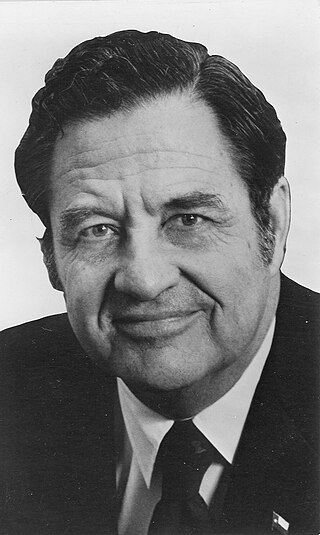
James Jarrell "Jake" Pickle was a United States Representative from the 10th congressional district of Texas from 1963 to 1995.
The 1980 October Surprise theory refers to an allegation that representatives of Ronald Reagan's presidential campaign made a secret deal with Iranian leaders to delay the release of American hostages until after the election between Reagan and President Jimmy Carter, the incumbent. The detention of 66 Americans in Iran, held hostage since November 4, 1979, was one of the leading national issues during 1980, and the alleged goal of the deal was to thwart Carter from pulling off an "October surprise". Reagan won the election, and, on the day of his inauguration—minutes after he concluded his 20-minute inaugural address—the Islamic Republic of Iran announced the release of the hostages.

The Texas State Cemetery (TSC) is a cemetery located on about 22 acres (8.9 ha) just east of downtown Austin, the capital of the U.S. state of Texas. Originally the burial place of Edward Burleson, Texas Revolutionary general and vice-president of the Republic of Texas, it was expanded into a Confederate cemetery during the Civil War. Later it was expanded again to include the graves and cenotaphs of prominent Texans and their spouses.
In the politics of the United States, an October surprise is a news event that may influence the outcome of an upcoming November election, whether deliberately planned or spontaneously occurring. Because the date for national elections is in early November, events that take place in October have greater potential to influence the decisions of prospective voters and allow less time to take remedial action; thus, relatively last-minute news stories could either change the course of an election or reinforce the inevitable. The term "October surprise" was coined by William Casey when he served as campaign manager of Ronald Reagan's 1980 presidential campaign. However, there were October election-upending events that predated the coining of the term.

The Lyndon B. Johnson School of Public Affairs is a graduate school at the University of Texas at Austin that was founded in 1970 to offer training in public policy analysis and administration for students that are very interested in pursuing careers in government and public affairs-related areas of the private and nonprofit sectors. Degree programs include a Master of Public Affairs (MPAff), a mid-career MPAff sequence, 16 MPAff dual degree programs, a Master of Global Policy Studies (MGPS), eight MGPS dual degree programs, an Executive Master of Public Leadership, and a Ph.D. in public policy. The LBJ School is currently ranked 7th among public affairs programs in 2022 by U.S. News & World Report, up from 8th in 2021.

William Pettus Hobby Jr. is an American Democratic politician who served a record eighteen years as the 37th Lieutenant Governor of Texas. He held that office from January 16, 1973, to January 15, 1991, for an unprecedented five terms; he was the last lieutenant governor to serve a two-year term and the first elected to a four-year term when the Texas Constitution was amended to lengthen terms for statewide elected officeholders to four years beginning with the 1974 elections. The principal duty of the Texas lieutenant governor is to preside over the Texas State Senate.
Texas Monthly Talks was a thirty-minute interview show on public television networks across the state of Texas hosted by Evan Smith, then Editor Emeritus of Texas Monthly magazine. Produced by Dateline NBC veteran Lynn Boswell, the show addressed contemporary issues in Texas politics, business and culture. Premiering in February 2003, the show was an original production of KLRU-TV, the PBS station serving Austin and Central Texas. In 2010 the series was succeeded by Overheard, with the same format, host and producer; the renaming was necessary because Smith had resigned his position at the magazine and had become Editor in Chief of the Texas Tribune.

Idanell Brill Connally was the First Lady of Texas from 1963 to 1969. She was the wife of John Connally, who served as Governor of Texas and later as Secretary of the Treasury.
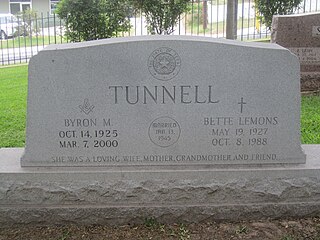
Byron Milton Tunnell was a state representative from 1957 to 1965, Speaker of the Texas House of Representatives from 1963 to 1965, and a member of the Texas Railroad Commission from 1965 to 1973.
Crawford Collins Martin was a Texas State Senator, Texas Secretary of State and Attorney General of Texas from 1967 until his death.

Joseph Richard Straus III is an American politician who served as the Speaker of the Texas House of Representatives from 2009 to 2019. A Republican, he represented District 121, which comprises northeastern Bexar County, including parts of San Antonio and several surrounding communities, from his first election to the House in 2005 until his retirement in 2019. He chose not to seek re-election to the state House in 2018.
Charls Edward Walker was Under Secretary of the United States Department of the Treasury from 1969 to 1972, and Deputy Secretary of the Treasury in 1973 under John Connally.

Carlos Flores Truan Sr., was an American businessman from Corpus Christi, Texas, who served for thirty-four years as a Democrat in both houses of the Texas Legislature. He was a state representative from 1969 to 1977 and a senator from 1977 until his retirement in 2003.
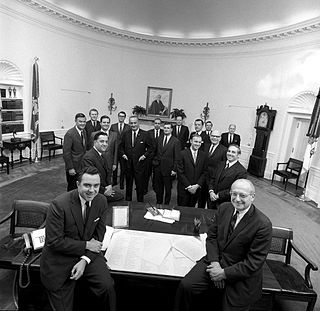
Larry Eugene Temple is an American attorney who served as the White House Counsel to President Lyndon B. Johnson from 1967 to 1969. From 1963 to 1967, he was the Executive Assistant to Texas Governor John Connally.
